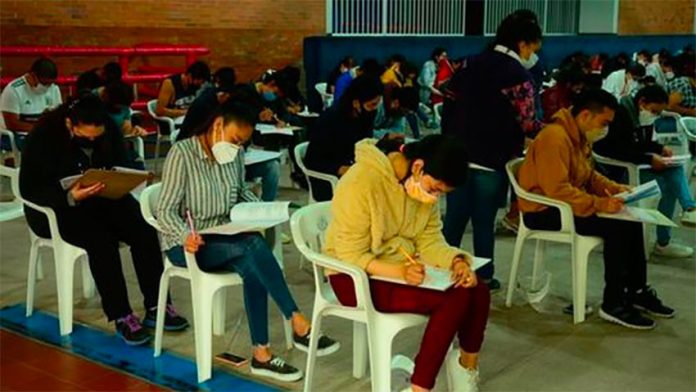The National Autonomous University (UNAM) opened the 2020–2021 school year Monday with classes again conducted online. But according to university officials, around 44,303 students enrolled have no internet access while about 13,000 have neither internet nor access to a computer.
Combined the numbers represent 12% of last year’s total enrolment of 360,000 students.
The return of students to distance learning this fall has given education officials at all levels across Mexico a harsh reminder of an already open secret: thousands of students enrolled in k-12 schools and universities here normally count on their school campuses to give them internet access or access to computers or both, a mostly-working situation thrown into disarray by the Covid-19 requirement to study at home.
Bryan Valencia, 18, a third-year UNAM student, was forced to drop out last April when his cell phone — his only access to the internet and his only way to attend classes once Covid-19 sent students home — was robbed. As the pandemic drove down his mother’s sales income, Valencia saw his economic difficulties multiplying and found he wasn’t able to make academic progress.
He opted to drop out for the rest of the school year so he could work and save money to pay for an internet connection.

He started the school year today, but a semester behind and not in a better economic situation: he has a phone again, but that’s it, other than a neighbor’s weak internet connection too unstable to stream his classes on his phone. He often encounters other technological obstacles as well: software required by his university is either difficult or impossible to use on a phone.
“I’m sad at how I’m falling behind, frustrated and disappointed at the situation in which I find myself,” he told Milenio. “I feel academically stuck.”
It’s not unlike the situation faced by Ana Paula González, a seventh-semester food chemistry student also at UNAM’s main campus. She can at least share a computer with her older sister, also a college student, but they struggle to coordinate computer use schedules. Buying a second computer for González is out of the question with Covid-19’s hit to the family’s finances, she said.
“With distance-learning classes, there are professors who put a real effort behind it and then there’s others who just don’t understand. I think that the university has not wanted to listen to the students, to what they need.”
A recent UNAM survey revealed that students studying at the preparatory level (senior high school) at UNAM are even worse off. Thirty-five percent of those students have no access to computers, compared to 17% of university students.
According to the survey, of the 111,067 students attending UNAM’s preparatory schools and science and humanities colleges, 42% —around 46,000—have no internet access. About 35% have no computer, and 22% have neither.
The problem is not limited to UNAM: one preparatory school in Sonora is asking the community for economic support for its low-income students and help them keep up technologically now that they’re learning at home. They don’t have the computers and internet access they need to succeed academically and communicate with teachers.
The Sonora science and technology colleges’ (Cecytes) new program, “Support Their Future,” is drafting volunteers from the community and from the school’s pool of alumni and asking them to provide the technological devices that are a necessary part of today’s college experience to a student without resources.
“We realize that we are going through difficult times due to the Covid-19 pandemic,” director Amos Benjamin Moreno Ruíz said. “And the economic circumstances are not equal for everyone. For that reason, we’re inviting ex-students and general community members to sponsor students and help them finish their studies, giving them a computer, laptop, tablet, or cell phone — new or in good condition — or help them have access to the internet, and thus be part of their education.”
Anyone interested in helping can contact Cecyte Sonora via their Twitter and Facebook accounts (@CecytesSonora) or by going to one of the school’s campuses. Volunteers will be officially named a Cecyte sponsor, Moreno said.
Source: Milenio (sp), El Universal (sp)
